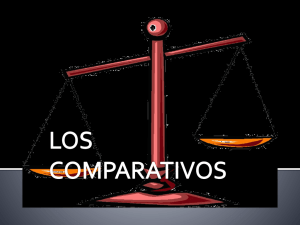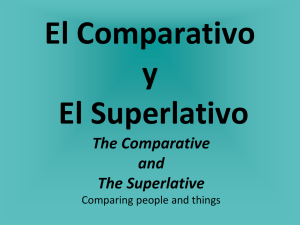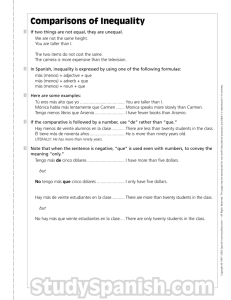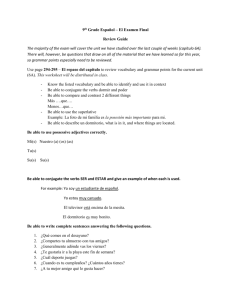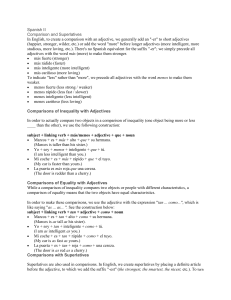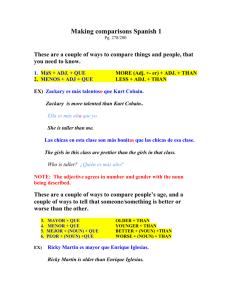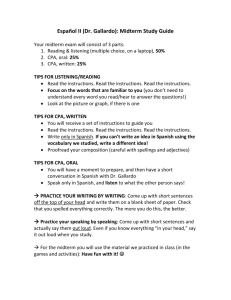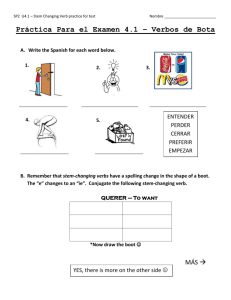You are taller than I.
advertisement
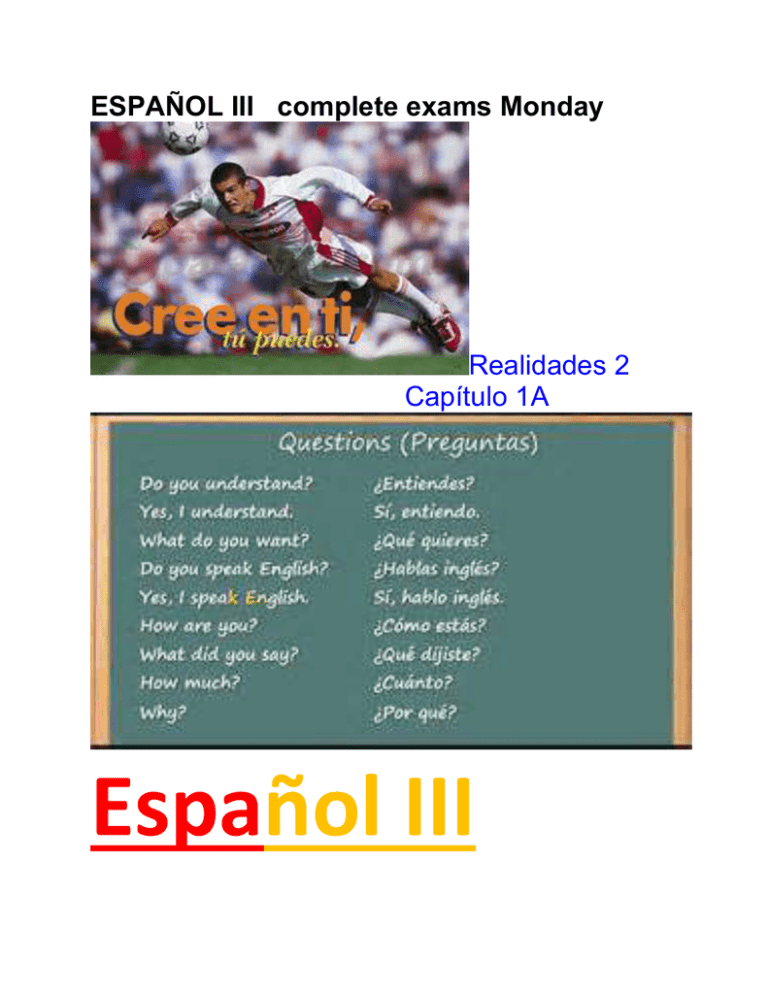
ESPAÑOL III complete exams Monday Realidades 2 Capítulo 1A Español III El 26 de septiembre 2014 Repaso se acaba Realidades 2- Review and practice from Capítulo 1A Pruebas Capítulo 1A Examen Capítulo 1A luner para thacer parte II LA TAREA Mini lección 12 to 15 minutes In home journal (notebook at home) TAREA homework is located at the bottom of this site Realidades 2 Capítulo 1B ¿Qué haces despúes de las clases? El Vocabulario Animador Animadora La música El músico La banda El equipo Ensayos Jugar El ajedrez Jugar a los bolos Las prácticas Hacer una búsqueda Crear una página Web Navegar la red La natación Ramón está en línea Las artes marciales El hockey Hacer gimnasia Actividades Realidades 2 Página 49 Actividad 3 ¿Comprendiste? Página 50 Actividad 4 ¿Las Actividades de mis amigos? Página 57 Actividad 16 ¡Qué emocionante! Hace + time Expressions "Hace ..." to mean "ago" In a previous lesson, you learned to use the verb hacer with the present tense form of a verb to indicate the length of time an action has been taking place: Hace + time + que + present tense form of the verb Hace un año que estudio español. I have been studying Spanish for one year. When the verb is in the preterite tense, a different meaning is conveyed: Hace + time + que + preterite tense form of the verb Hace un año que estudié español. I studied Spanish one year ago. There is another way to convey the same idea: Preterite tense form of the verb + hace + time Estudié español hace un año. I studied Spanish one year ago. Note the differences and similarities: Hace un año que estudio español. I have been studying Spanish for one year. Hace un año que estudié español. I studied Spanish one year ago. Estudié español hace un año. I studied Spanish one year ago. Comparisons of Inequality 1. If two things are not equal, they are unequal. We are not the same height. You are taller than I. The two items do not cost the same. The camera is more expensive than the television. In Spanish, inequality is expressed by using one of the following formulae: más (menos) + adjective + que más (menos) + adverb + que más (menos) + noun + que Here are some examples: Tú eres más alto que yo. You are taller than I. Mónica habla más lentamente que Carmen. Monica speaks more slowly than Carmen. Tengo menos libros que Arsenio. I have fewer books than Arsenio. If the comparative is followed by a number, use de rather than que. Hay menos de veinte alumnos en la clase. There are less than twenty students in the class. Él tiene más de noventa años. He is more than ninety years old. (Literally: He has more than ninety years.) Note that when the sentence is negative, que is used even with numbers, to convey the meaning "only." Tengo más de cinco dólares. (I have more than five dollars.) but No tengo más que cinco dólares. (I only have five dollars.) Hay más de veinte estudiantes en la clase. but No hay más que veinte estudiantes en la clase. (There are only twenty students in the class.) Comparisons of Inequality with Adjectives In order to actually compare two objects in a comparison of inequality (one object being more or less ____ than the other), we use the following construction: subject + linking verb + más/menos + adjective + que + noun Marcos + es + más + alto + que + su hermana. (Marcos is taller than his sister.) Yo + soy + menos + inteligente + que + tú. (I am less intelligent than you.) Mi coche + es + más + rápido + que + el tuyo. (My car is faster than yours.) La puerta es más roja que una cereza. (The door is redder than a cherry.) Comparisons of Equality with Adjectives While a comparison of inequality compares two objects or people with different characteristics, a comparison of equality means that the two objects have equal characteristics. In order to make these comparisons, we use the adjective with the expression "tan ... como...", which is like saying "as ... as... ". See the construction below: subject + linking verb + tan + adjective + como + noun Marcos + es + tan + alto + como + su hermana. (Marcos is as tall as his sister). Yo + soy + tan + inteligente + como + tú. (I am as intelligent as you.) Mi coche + es + tan + rápido + como + el tuyo. (My car is as fast as yours.) La puerta + es + tan + roja + como + una cereza. (The door is as red as a cherry.) Comparisons with Superlatives Superlatives are also used in comparisons. In English, we create superlatives by placing a definite article before the adjective, to which we add the suffix "-est" (the strongest, the smartest, the nicest, etc.). To turn this into a comparison, we add the group to which the object or person is being compared (She's the prettiest in the class / at the party / of her friends.). To convey this same concept in Spanish, we use a construction very similar to the other comparison formulas we have reviewed, with the definite article (el, la, los, las) preceding the comparison word (más, menos) and using de instead of que. subject + verb + definite article + más/menos + adjective + de + rest of sentence María + es + la + más + guapa + de + sus amigas. (María is the prettiest of her friends.) Mi coche es el más caro de todos. (My car is the most expensive of them all.) Sara es la menos alta de su clase. (Sara is the least tall of her class.) Pedro es el menos rápido de su equipo. (Pedro is the least fast of his team.) Comparisons with Adverbs The same formula is used in comparisons with adverbs, the only difference being that you won't have to worry about gender given that adverbs have only one form. (Need a refresher on how to form the superlative? Take a look at this page: Spanish adverbs) subject + verb + más/menos + adverb + que + noun Sara + estudia + menos + diligentemente + que + Marcos. (Sara studies less diligently than Marcos.) Su casa + está + más + lejos + que + la mía. (His/Her house is farther than mine.) Irregular Comparisons Both English and Spanish have several "irregular" comparison words, meaning that the adjective changes. Take, for example, the adjective "bad". If we followed normal rules for forming comparisons, we would say "badder" instead of the irregular comparison word "worse". The same goes for Spanish; the word for bad is "malo" but in comparisons instead of saying "más malo" we say "peor". See a few examples below: Normal adjective Adjective in comparison good = bueno better = mejor bad = malo worse = peor big = grande bigger = mayor (referring to age) old = viejo older = mayor young = joven younger = menor little = pequeño littler = menor (referring to age) Another look- *Comparatives and Superlatives: Talking about what's Good, Better and Best Understanding Comparatives and Superlatives Let’s talk about the best band of all time, who is the oldest person in your class, and how your friend’s car compares with yours. You can compare things just as easily in Spanish as you can in English. You should already be familiar with the concept of good, better, and best. When you’re talking about one thing, it’s good. When you’re comparing it to something else, it’s better. When you say that it is better than anything else, it’s the best. If you understand this, you already know what a comparative and a superlative are. -Words that compare one thing to another (e.g., better, older) are called comparatives. - Words that put something at the top or bottom of the class, so to speak, (e.g., best, oldest) are called superlatives. Below are some common comparatives and superlatives in Spanish. Look at the table and follow each word from left to right. bueno good mejor que better than malo bad peor que worse than worse viejo old mayor que older than older joven young menor que bueno good younger than el / la mejor the best malo bad el / la peor the worst viejo old el / la mayor the oldest joven young el / la menor the youngest EXAMPLES (You should also know that bien and mal share the same construction as bueno and malo.) Let’s say that you want to talk about your favorite soccer team. Mi equipo de fútbol favorito es muy bueno. My favorite soccer team is very good. Say that you want to claim that your favorite soccer team is better than your friend’s. Mi equipo de fútbol favorito es mejor que el tuyo. My favorite soccer team is better than yours. Now, say that you want to boast that your soccer team is the best of all! ¡Mi equipo de fútbol es el mejor! My soccer team is the best! For Better or for Worse: MEJOR QUE and PEOR QUE When you want to compare the age (older, younger) or quality (better, best) of two things, you will use the comparative form of the adjective plus than. For example: mejor que better than peor que worse than mayor que older than menor que younger than If you want to say, for example, that your sister is older than you are, you will say, “Mi hermana es mayor que yo.” Por ejemplo: El hermano de Juan es mayor que él. Juan’s brother is older than him. El sombrero negro es mejor que el sombrero blanco. The black hat is better than the white hat. La primera banda fue mejor que la segunda. The first band was better than the second. The Best of All: LA MEJOR If you want to say that your sister is the oldest in your family, you will simply add the article “the” to the comparative form of the adjective. The sentence becomes: “Mi hermana es la mayor.” Por ejemplo: Él es el mejor cantante del mundo. He is the best singer in the world. Ella es la peor estudiante de la clase. She is the worst student in the class. La señora es la mayor del barrio. The lady is the oldest in the neighborhood. Margarita es la hija menor. Margaret is the youngest daughter. You will notice that the word de is often used with superlatives. When used after a superlative, de can mean “in” or “of.” Por ejemplo: El jugador es el mejor de todos. The player is the best of all. Lupe es la mejor trabajadora del grupo. Lupe is the best worker in the group. Notice that in the second example, de has combined with el to form del. This is identical to the formation of al from a and el. Anytime you see de and el together, remember: de + el = del The Most of All: MÁS DE You can also form superlatives by talking about the strongest, coolest, fastest thing of all. Whereas you form these superlatives in English by adding an –est to the end of the adjective or adverb, you form them in Spanish by using the word más instead. Más means more. If you wish to talk about “the hottest day of the summer” in Spanish, you’ll have to say “the day most hot of the summer.” Sound strange? Remember that in English, not all adjectives can be transformed with an –est ending. You can’t say “beautifulest” or “expensivest”! In those cases, you form the superlative just as it is done in Spanish: you talk about the “most beautiful” or the “most expensive.” That’s exactly how it’s done in Spanish. All other superlatives will be formed using the sentence construction below. noun + “más” + adjective or adverb + “de” + noun In Spanish, then, the phrase “the hottest day of the summer” will become: el día + más + caluroso + del + verano Por ejemplo: Hoy es el día más caluroso del verano. Today is the hottest day of the summer. La primavera es la estación más lluviosa en mi región. The spring is the wettest season in my region. Los matadores profesionales solo usan los toros más fuertes de España. Professional bullfighters only use the strongest bulls in Spain. Estas son las flores más hermosas de mi jardín. These are the most beautiful flowers of my garden. Juan tiene la guitarra más cara del grupo. John has the most expensive guitar in the group. Super Cool: The Ending -ísimo In Spanish, there’s another way of expressing how something is just the “mostest.” You can intensify the meaning of any adjective by adding the ending ísimo. This is the English equivalent adding a “very” or “super” before the adjective. Por ejemplo: La comida está riquísima. The food is super delicious. Estás bellísima, mi hija. You’re gorgeous, my daughter. El atleta corrió rapidísimo en la competencia. The athlete ran super fast in the competition. La noche estuvo heladísima. The night was super cold. Some More Comparisons: MÁS QUE and MENOS QUE Other comparisons you will make will be of the greater and lesser sort. In other words, you will say that something has more or less of a quality than the other thing. For example, • Julie has more pens than Matt. • San Francisco has fewer people than Los Angeles. • When it comes to shoes, Annette has more than her sister. Notice that the words “more” and “less” are followed by a “than.” In Spanish, it’s just the same, but instead of talking about “more than” you will talk about más que. más que = more (or greater) than menos que = less (or fewer) than Por ejemplo: Ricardo es más inteligente que José. Richard is more intelligent than Joe. Elena tiene menos dinero que Nadia. Ellen has less money than Nadia. Javier es más fuerte que su hermano. Javier is stronger than his brother. Pedro come menos que Miguel. Peter eats less than Michael. El pasaje de tren cuesta menos que el de avion. The train ticket costs less than the airplane ticket. Expressing How Things are Alike: TAN COMO and TANTO COMO You can also use comparatives to describe how similar two things are. For example, you might wish to say: • You’re as nice as your sister. • I have as many toys as you. Expressions like tan … como and tanto … como help you do that. When you compare two things that are similar in English, you often use as … as, whether or not the word that the two things have in common is a noun, adjective, or adverb. In Spanish, however, there is a distinction. - Use tan … como for “as … as” when the characteristic in common is an adjective or adverb. - Use tanto … como for “as many … as” or “as much … as,” when the characteristic in common is a noun. Go back and look at the sample sentences in English above. Can you guess which would use tan … como and which would use tanto … como? • Eres tan amable como tu hermana. (“nice” is an adjective) • Tengo tantos juguetes como tú. (“toys” is a noun) Remember that the word tanto must reflect the gender and quantity of the noun it describes. • Tengo tanto dinero como él. • Ella tiene tantos zapatos como su amiga. • Nosotros tenemos tanta comida como los otros. • Ustedes tienen tantas cosas como nosotros. Tu auto es tan lento como un caracol. Your car is as slow as a snail. ("slow" is an adjective) Tenemos tantas vacas como ovejas. We have as many cows as sheep. ("cows" is a noun) Carlos es tan guapo como su hermano. Charles is as handsome as his brother. ("handsome" is an adjective) Tú tienes tantas ideas como yo. You have as many ideas as I do. ("ideas" is a TAREA Realidades 2 EXAMEN LA TAREA!!!!! TAREA PARA LUNES Complete On looseleaf full heading Realidades 2 Pagina 57 Actividad 16 Hoja libre Título completo ¡Gracias! ¡NO TAREA ESTA NOCHE! ¡NO TAREA para viernes!
